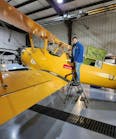Mar. 4—NASHUA — Two mates who roomed together at University of Cambridge in the United Kingdom are working to make helicopters fly without pilots, especially on dangerous missions such as battling wildfires.
But Greg McMillan didn't think he would be logging thousands of air miles, via Hong Kong, to land in New Hampshire.
"It wasn't in the cards," he said, thinking back to his university days.
Two years ago, while working in finance in Hong Hong, McMillan got a call from his former roommate, Hector Xu, who was at the Massachusetts Institute of Technology in a different Cambridge.
The pair searched small airports around New England and chose Nashua, the same airport where Xu learned to pilot helicopters, to operate their company, Rotor Technologies.
Xu brought along people he met at MIT and grew the company to 25 workers operating in a nondescript airport hangar.
"There's this trust with having grown up together that's unbeatable," McMillan said Friday.
The company is developing equipment to install on helicopters so pilots on the ground can remotely fly them anywhere in the world.
McMillan said he expects the company to start generating revenues in 2024, but "profitability on a longer time scale would be longer than five years (away)."
Its target market is government agencies in both the federal and state governments.
The company has received $21 million in venture capital, but penny-pinching was evident during a tour Friday with Sen. Maggie Hassan, D- N.H.
Company founders showed a circuit board inside a glass and metal box.
"That is our thermal testing rig, but it's actually a pizza oven," said Xu, the company's CEO.
The company bought the pizza oven online for a few hundred bucks, saving tens of thousands of dollars off the cost of using a professional testing lab.
The circuit board controls a helicopter's engine, so an overheated circuit board could prove deadly.
"This pizza oven is like going to potentially save lives some day in the future," Xu said.
"That's a good, fun and basic story, too, about don't overthink things sometimes, right," Hassan said.
McMillan, the chief operating officer, later explained the life of many startups.
"That's what we're trying to do, answer questions and solve problems.," he said. "You need these like creative cheap solutions to do very, very, very quickly, because then we can prototype, prototype, prototype, prototype, test, experiment, test, experiment."
Many of the long-term decisions are yet to be made: where to manufacture equipment and which path to take to monetize their efforts.
"This kind of technology is quite cutting-edge," McMillan said. "We brought the best people in we could find and made it work for them."
Immigration limits have complicated efforts to recruit some workers from abroad.
A pilot on the ground could operate the helicopter with the aid of a camera in the cockpit, its seats stripped out.
McMillan was impressed by the state's "traditional aerospace engineering" and the helpfulness of airport neighbors to pitch in with advice or a spare tool.
Hassan said she helped secure a $456,000 federal grant for Nashua Community College to expand job training programs for aviation, possibly providing future workers for Rotor Technologies.
The company solved a question that challenges many other businesses: where to house workers.
About two-thirds of the company's employees, including Xu and McMillan, live at least during the work week in dorm rooms that once housed students of Daniel Webster College.
That's a bit different than before the two men graduated from Cambridge University in 2016.
At Cambridge, "you live in a castle with a bunch of other 19- and 20-year-olds," McMillan said.
Fighting fires
Last Monday, McMillan said he was with the U.S. Forest Service in Albuquerque, New Mexico, "to learn about what they're needing in terms of wildfire mitigation" and aerial firefighting.
The company's technology could theoretically keep helicopters in the air up to 20 hours a day compared with sometimes two or three hours a day now, McMillan said.
Getting wildfires under control sooner also would benefit people in the Granite State.
"A big wildfire in California makes air quality in New Hampshire worse," McMillan said. "It's a nice trans-America story."
Hassan recalled her days as governor when search and rescue teams didn't have sufficient visibility to fly missions.
"Having been told multiple times we didn't, it's tough," Hassan told the company founders.
Rotor Technologies is "looking to reach a level of technological readiness in 2024," McMillan said.
Regulatory approvals could take up to a year or more, he said.
Employee Andrew Merlino's tasks include flying a helicopter-looking drone to test systems.
"My dad's been doing it (as a hobbyist) since the '80s, so I grew up around it," Merlino said of the family's interest in flying remote aircraft.
"I think there's a lot of passion that I have in this hobby, so it's really nice to be doing something that I really do enjoy every day," Merlino said.
___
(c)2023 The New Hampshire Union Leader (Manchester, N.H.)
Visit The New Hampshire Union Leader (Manchester, N.H.) at www.unionleader.com
Distributed by Tribune Content Agency, LLC.
